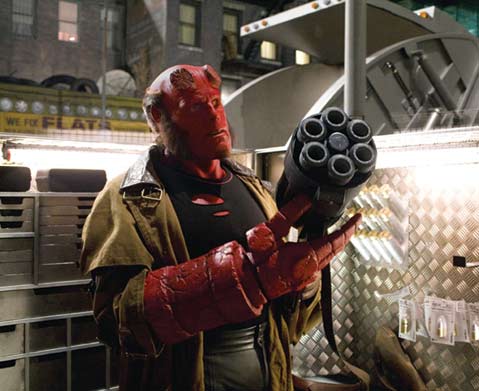Hellboy II: The Golden Army
Ron Perlman, Selma Blair, and Jeffrey Tambor star in a film written and directed by Guillermo del Toro.

Guillermo del Toro may be a genius, but in real life he’s insanely funny. Listening to the auteur behind such intricately horrifying meditations on power and libido as Cronos and Pan’s Labyrinth speak in his characteristic torrents of thoughtful reflection and expertly profane English, you realize that inside his artistic soul beats a boyish heart-one infatuated with the Universal monsters like Dracula, Frankenstein, and the Werewolf. (The Creature from the Black Lagoon is reportedly his favorite.) In fact, it’s the heart of an eccentric, talented man who seems born to direct the Hellboy franchise; making it funny, thrilling, and creepy enough to satisfy.
In the first installment, made four years ago and only mildly successful, critically speaking, del Toro combined elements from the great Mike Mignola comics-witty comic repartee and indomitable monster foes-but threw in his own brand of inspired imagery, such as the eerily bagged trees growing in an insane asylum’s moonlit garden. In the second chapter, del Toro seems more interested in filling the screen with a Miltonic pandemonium filtered through European folktales, trolls, and hags. These are monsters that are so indelicately bizarre-yet so gorgeously lavished with detail-that they seem preposterously more sympathetic than humans or even the “good” monsters-like Hellboy and his new boss, the ingenious revision of Frank Baum’s Tik-Tok of Oz known as Johann Krauss (voiced by Seth MacFarlane.)
Most people prefer this outing to the previous, but I found it slightly padded. It’s still a blast, though. Besides action and spectacle, del Toro understands and conveys a deeper emotion than most comic-book-to-film adapters normally attempt. He knows that the world of fantasy and the subculture of elemental things that live in our imagination exist for a reason. They represent the disturbing facts we had to pave over to make a civilization possible. Hellboy chiefly wants us to feel sad that we’ve abandoned childish terror for human denial. The monsters of del Toro are sweet because they understand doom, and Hellboy works as both cheesy entertainment and profound spectacle because it’s rooting for the monsters to break free of us.



